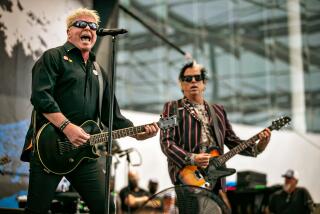As a Tribute Shows, the Clash Still Has Some Lessons to Teach
- Share via
The Ramones invented punk-rock, and the Sex Pistols put it on the map, but it was the Clash that left us its legacy.
That’s worth remembering as it becomes more and more obvious that punk is not going away. More than 20 years after its big bang, the music continues to provide a resonant musical and lyrical vocabulary to restless youth. It probably wouldn’t have penetrated like that if it hadn’t been for the Clash’s double whammy--its greatness as a band, and its refusal to remain confined in its genre.
How great was the Clash? The English band isn’t exactly in danger of being forgotten--its attitude and attack are very much with us in such diverse heirs as Rage Against the Machine and the Offpsring, Beastie Boys and Green Day.
But 16 years after the band dissolved, the precise ingredients that gave the Clash its impact tend to be overshadowed by the larger Clash legend.
“Burning London,” a new Epic Records collection of Clash songs interpreted by current acts including No Doubt, Third Eye Blind and the Afghan Whigs, is a perversely instructive reminder of the Clash’s power.
A couple of the cuts manage to connect. Cracker’s comically doleful, Randy Newman-like approach to “White Riot” massages the humor of the lyric, which laments the reluctance of the Clash’s brethren to act up in the fashion of their more demonstrative neighbors.
And in the album’s best moment, L.A. rap icons Ice Cube and Mack 10 use the monumental guitar riff of “Should I Stay or Should I Go” as a launching pad for a ferocious display of rapping and production prowess.
The track’s imagination and irreverence have much more to do with the Clash’s essence than the pointlessly unimaginative remakes that predominate on the collection. The skittering reggae-ska of the Mighty Mighty Bosstones and 311 is a weak descendant of the Clash’s deeply scored Jamaican grooves, and No Doubt’s “Hateful” is anemic and mannered.
What the album may do best is make us go back and listen to the Clash itself to make sure we were hearing right in 1977.
When you do, you find a group that was everything a rock band (not just a punk-rock band) should be--defiant and vulnerable, down to earth and larger than life. Like one of their models, the classic British underdog band Mott the Hoople, they transmitted an alternating current of challenge and reassurance.
*
The singles from their first years had an immediacy and spontaneity, as well as hints of the distinctive talent and chemistry that would soon mature in unexpected ways. Bassist Paul Simonon and drummer Topper Headon’s rhythm section provided urgency as they anchored and pushed the beat. Frontmen Joe Strummer and Mick Jones added classic guitar hooks, and in such signature songs as “1977” and “Career Opportunities,” Strummer’s corrosive vocals assailed his targets like a flame-thrower. Forged in the white-hot intensity of London’s punk movement, the Clash made records that were received like dispatches from the front in a great cultural war.
The Clash wasn’t the first band to attack complacency, but its combination of commentary and catchiness made it the dominant force in punk. Ultimately, though, it was its refusal to play by the punk rules--as rigid in their way as the social conventions the Clash abhorred--that was its lasting contribution.
When the musicians’ musical roots--including blues, folk, early rock ‘n’ roll and branches of soul--inevitably emerge, most notably on 1980’s landmark “London Calling” album, the Clash demonstrated that they could reach a large audience without diluting their essence or corrupting their ideals.
Its declaration of independence wasn’t as dramatic and clear-cut as Dylan going electric, but it was a revolutionary notion in the politicized atmosphere of the punk-rock world, where gestures toward fame and the mainstream were viewed with suspicion.
The Clash built the bridge that let punk’s values cross into mass culture, and when it’s time for another tribute album, the participants should honor not just arrangements and chord progressions, but also the tenacity, independence and honesty it took to do that job.
*
Hear the Music
* Excerpts from these albums and other recent releases are available on The Times’ World Wide Web site. Point your browser to: https://www.calendarlive.com/soundclips
More to Read
The biggest entertainment stories
Get our big stories about Hollywood, film, television, music, arts, culture and more right in your inbox as soon as they publish.
You may occasionally receive promotional content from the Los Angeles Times.










